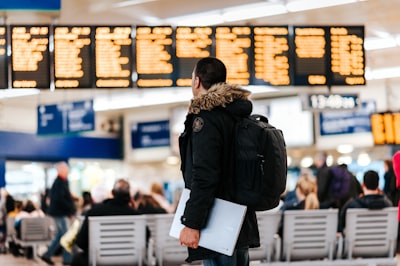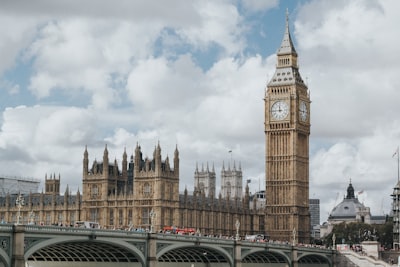Newcomer's Guide: Renting in the UK for the First Time
Renting in the UK for the first time can be a hassle for many reasons. The UK rental market moves very quickly and in recent times, there has been a dwindling supply of homes. Then, you will have to find adequate accommodation within a reasonable budget and ultimately get the landlord’s approval.
The process of finding a home is a difficult aspect of relocation that a lot of newcomers face.
This article provides a guide to understanding the UK rental market and offers practical advice on what you should know while renting.
Photo by chris robert on Unsplash
How does renting work in the UK?
- Prove your right to rent
First, as a newcomer, you need to confirm that your immigration status gives you the right to rent in the UK. You will surely need to prove this to your prospective landlord or letting agent before you can be offered a tenancy contract.
To confirm your right to rent in England, visit gov.uk and follow the prompt till you generate the ‘right to rent’ confirmation statement and a ‘share code’ you will provide to your landlord or letting agent.
➤ Prove your right to rent online
- Begin your house search
Next, you have to begin your housing search using the right platform. You can start searching for rental properties online even before you arrive in the UK using property listing websites such as Zoopla, Rightmove, OnTheMarket, OpenRent, SpareRoom and Gumtree. These platforms aggregate different listings from a range of letting agents providing you with a variety of options in different cities.
If you’re house hunting while in the UK, it could help to contact a few rental agencies within your locality as well. While you can rent from a private landlord or a rental agency, a lot of properties are listed through letting agencies and sometimes, they are also responsible for managing the property. It's worth noting that renting directly from the landlord is usually cheaper since the rental costs exclude agency fees.
On rental websites, properties are listed based on location, price and furnishings so you are able to quickly narrow down suitable options.
What are your options?
There is a variety of housing options available based on your preference, budget and individual circumstance. Some of the popular housing options in the UK include:
Studio - a single large room that comprises the kitchen, living area, sleeping quarters and an en suite bathroom.
House Share- a type of living arrangement where you have a private bedroom and share other communal spaces like the living room bathroom and kitchen with other residents of the house. Also known as a house in multiple occupations, housing sharing is one of the most cost-effective ways to rent as an immigrant. It also creates the opportunity for making your first friends.
Flat/Apartment- a flat is usually a type of accommodation that is part of a larger residential building with a suite of rooms including a kitchen and at least a bathroom.
House- a semi-detached, detached or terraced house with a minimum of 2 bedrooms. Renting a whole house offers more space and usually comes with a backyard and a driveway.
What documents do you need?
Once you have found a suitable place you’d like to rent, the next step is to provide your documentation. Most landlords require the following documents:
- Proof of your immigration status
- A share code
- Your passport as a means of identification
- A character reference from your current or previous landlord
- A reference letter from your employer, confirming your job and salary
- Recent payslips/bank statements to prove you can afford the rent
With these documents, the landlord or letting agent performs a referencing check to determine whether you’re likely to be a reliable tenant. This could also include a credit check to look into your history of bills payment. In the UK, a successful housing search ends when you have passed the referencing checks and completed the paperwork.
What to watch out for before you rent
It is important to physically view and inspect the property you want to rent before you sign the tenancy contract. However, you should request a virtual viewing of the property if you are unable to visit.
During your viewing, you should ask important questions such as:
- What are the bills to pay and who is responsible for each? – these include gas, electricity, water, council tax, tv licence, internet and phone bills
- What is the duration of the tenancy contract?
- What are the house rules? – This usually specifies rules around keeping pets, hosting overnight visitors and indoor smoking.
- Are you allowed to redecorate or make changes to your room/apartment?
- Who is the point of contact in case of an emergency?
- Are you required to pay any additional service charge?
- Is there a smoke and Carbon Monoxide detector installed?
Aside from these questions, you should also check for the following:
- Any signs of moulds or pest infestation
- Confirm that the external fixtures are in good condition
- Validity of the safety certificate
- An energy performance certificate
- The general safety of the neighbourhood
Check with your accommodation provider that:
✅ the landlord or letting agent is not charging any viewing fees and tenancy set-up fees
✅ the property is safe to live in and free from things that could cause serious harm
✅ you are happy with fixtures and fittings, as you may be unable to get them changed once you have moved in
✅ at least one smoke alarm is installed on every storey of a property
✅ carbon monoxide detectors are installed if you have solid fuel appliances like wood-burning stoves or open fires
✅ whether the Landlord’s insurance covers your personal possessions from theft, loss, and damage. If it is not covered, you may like to arrange home insurance yourself.
Signing your Tenancy Agreement
When a landlord approves you for a place, you have to sign a fixed-term agreement which will specify the agreed rental costs and sets the minimum rental period.
To secure your rental, you’ll typically have to make two payments upfront. First, there is the deposit, which is equivalent to 5 weeks’ rent or less and the first month’s rent. The deposit is requested as insurance against breach of the tenancy agreement or to cover the costs of repairs in case of damage to the property during your tenancy.
By law, the landlord is required to protect your deposit under a government-approved tenancy deposit scheme. This guarantees that you will get your deposit back at the end of the tenancy provided you don’t damage anything on the property or break the terms of your tenancy. In case your landlord wants to make unfair deductions from your deposit, the scheme will act as a dispute mediator and provide an impartial decision.
Once you have signed your tenancy agreement, you are all set to move into your new place. On the day you move in, take inventory of all the contents of your apartment, detailing the condition of every piece of furniture and fittings so that it can be compared with the condition when you move out.
Tips
- The How to rent guide is a good resource that will help you navigate the UK housing market.
- Work out your budget for rent before you start looking for a new rental home. You should have a clear understanding of what you can afford to pay in rent and allot towards monthly bills.
- If you have difficulty renting a place because of the strict requirements, it’s best to rent directly from a private landlord. However, you will have to convince and prove to him/her that you are good for rent.
- Avoid renting or signing a tenancy agreement with an existing tenant. Most landlords have strict rules against subletting so you might want to avoid legal troubles.
- If you are a single student, try student accommodations or shared housing as the landlords might show more consideration when vetting you for rent.
- Be well aware of your rights and responsibilities as a tenant. This way you are protected from unfair treatment or unwarranted eviction. You may also be able to challenge unreasonable rent increases.
- If you have any dispute with your landlord at any point during your stay, you can seek assistance from Citizen's Advice or Shelter at no cost.
- Your landlord is responsible for regular gas and electricity safety checks and maintaining the property to standard. You should also ensure that a working smoke alarm has been installed on the property.
The moving checklist on the Maze App outlines the step-by-step process of finding your ideal home. Download the Maze App today and start your search with the right guidance.
Government Resources
Guidance for renting in; England, Scotland, Wales, and Northern Ireland
Maze provides an end-to-end platform that disrupts the traditional relocation model.
We connect people relocating with service providers, reduce cost and enable the personalization of customer journeys to the UK.
Follow us on Instagram, Twitter, Facebook and LinkedIn, or Contact us with your relocation enquiries.



